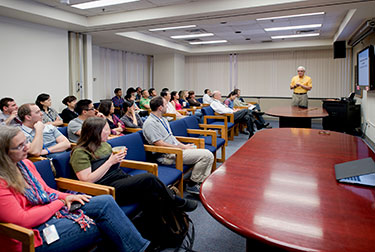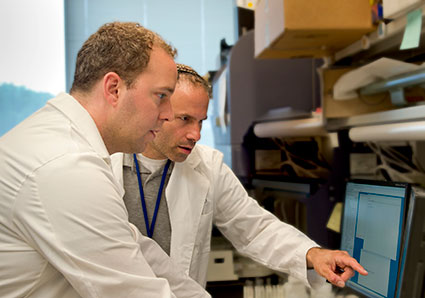The NIAID Clinical Genomics Program at the National Institutes of Health (NIH) is a broadly collaborative program that builds upon large-scale gene sequencing analysis to promote multi-disciplinary, cutting-edge basic and clinical genomics research. Our goal is to better understand, diagnose, and treat disorders of the immune system in collaboration with clinical agents.
News & Events
News
Feb 2017 Trip to UK for collaboration meetings with Genomics England, Wellcome Trust, and Sanger Center.
More funded exomes are available. Please email us if interested.
Events
Weekly Brown Bag Lunch Series

Weekly Genomics and Immunology Science Brown Bag Lunch Series, Tuesdays, 12 Noon, Building 10, Room 2C310
Currently Available Resources
Researchers involved with the Clinical Genomics Program study many diseases of the immune system that are rare and not well understood but often shed light on basic immune function and common immune disorders. This research is carried out across multiple labs, disease processes, and with many different tools.
The Clinical Genomics Program centralizes resources to be used for genomics and related research. Contact us to discuss use of any of the currently available resources:
- MiSeq machine and reagents
- Free sequencing
- Whole exome sequencing (WES) with secondary findings analysis through NIH Clinical Center program
- WES through Regeneron
- Whole genome sequencing (WGS) through Merck
- WES at reduced price through the National Intramural Sequencing Center
- Funded targeted clinical testing available through outside commercial labs
- Other providers as available; access may depend on suitability of cases, as determined by funders
- Help with WES/WGS analysis
- Genetic counseling, pedigree collection, educational material development
- Select funding for training in genomics or immunology
- Outreach help when screening for phenotypes/genotypes
Participating NIH Researchers
- Dr. Jeffrey Cohen, Medical Virology Section, Laboratory of Infectious Diseases
- Dr. Thomas Fleisher, Department of Laboratory Medicine, NIH Clinical Center
- Dr. Pamela Guerrerio, Food Allergy Research Unit, Laboratory of Allergic Diseases
- Dr. Steven Holland, Immunopathogenesis Section, Laboratory of Clinical Infectious Diseases
- Dr. Amy Klion, Eosinophil Pathology Section, Laboratory of Parasitic Diseases
- Dr. Michael Lenardo, Molecular Development of the Immune System Section, Laboratory of Immunology
- Dr. Michail Lionakis, Fungal Pathogenesis Unit, Laboratory of Clinical Infectious Diseases
- Dr. Dean Metcalfe, Laboratory of Allergic Diseases, Mast Cell Biology Section
- Dr. Joshua Milner, Genetics and Pathogenesis of Allergy Section, Laboratory of Allergic Diseases
- Dr. Philip Murphy, Molecular Signaling Section, Laboratory of Molecular Microbiology
- Luigi Notarangelo, Laboratory of Host Defenses
- Drs. Sergio Rosenzweig and Alexandra Freeman, Primary Immune Deficiency Clinic
- Dr. Pamela Schwartzberg, Cell Signaling and Immunity Section, National Human Genome Research Institute
- Dr. Helen Su, Human Immunological Diseases Section, Laboratory of Host Defenses
- Dr. John Tsang, Systems Genomics and Bioinformatics Unit, Laboratory of Systems Biology
- Dr. Raphaela Goldbach-Mansky, Translational Autoinflammatory Disease Studies Unit, Laboratoray of Clinical Infectious Diseases
Collaborations

Collaboration is a key element of the Clinical Genomics Program mission to accelerate scientific discovery related to the understanding, diagnosis, and treatment of genetically based immune disorders. The program cultivates both public and private collaborations with institutions and investigators from around the world in an effort to foster scientific discovery. Listed below are some of the institutions, companies, and partnerships developed among Clinical Genomics Program researchers:
- Merck
- Regeneron
- Novartis
- Broad
- Yale
- University of Michigan
- Qatar Women and Children's Hospital
- Kansas City Children's Mercy Hospital
- Cincinnati Children's Hospital
- Boston's Children's Hospital
- University of Pennsylvania
- Tubitak (Turkey)
- University Hospitals in Ankara, Hacettepe, Marmara, and Istanbul
Treatment Trials
Collaborations that uncovered the underlying genetic and cellular causes of specific immune disorders have, in some cases, resulted in novel treatments. Three such novel treatments are being actively investigated through a clinical treatment trial at NIH:

